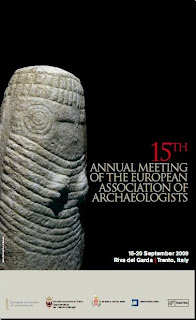
The meeting is organised by the Archaeological Heritage Office of the Province of Trento and by the Town Council of Riva del Garda, whose Museum, situated in the historic fortress constructed in 1124, hosts an important archaeological collection. This event of major importance will be the occasion for the participants for an exchange of opinions, in order to foster a debate about the different natures of archaeology in Europe and to encourage cooperation amongst organisations which deal with the discipline.
The meeting will take place in the Congress Centre and will consist of meetings, round tables, presentations of posters and a temporary bookshop together with the possibility for publishing houses and other companies of the sector to promote themselves. Other activities at the Museum of Riva del Garda, as well as excursions, guided tours and cultural initiatives aiming at an interaction with the territory will be organised.
Please note that the deadline for the submission of session proposals by the session organisers was postponed to 15th May 2009. The deadline for the submission of papers and posters is 31st May 2009. For further information, read the guidelines or contact the Scientific Secretariat : scientific_s@eaaitaly2009.com.
Call for Papers for the session "The End of Empire : the archaeology of borderlands in the Early Medieval Period" (Organiser : Susanne Hakenbeck, UK)
Session proposal : During late Roman and early Medieval Periods the borderlands of the Roman Empire occupied a complex and paradoxal place in the worldview of the populations that lived near them. From the third century AD onwards, the Empire had increasingly made use of barbarian groups to defend its frontiers against other barbarians. After the end of the Roman Empire some of these areas developed into into the new barbarian polities that came to define themselves as the inheritors of the Roman Empire. The activities in these frontier zones thus represent both geographically and temporally 'the end of Empire'. Yet in the late Roman and early Medieval periods the borderlands were also areas of intense and complex interactions between the populations along the edge of the (former) Empire. Not all structures were defensive, frontier lines could shift, and barbarians could be settled on both sides of the border.
The aim of this session is to initiate a discussion on the role of borderlands in the collapse of the Roman Empire and in the subsequent creation of the barbarian polities. Contributions are invited that question rigid notions of frontiers and intead aim to examine the complex relationships of different peoples, material culture and social practices in these areas. A variety of questions could be addressed, such as : how did people negociate frontier structures such as fortifications ? What was the impact of migration and mobility in these areas ? To what extent did populations in the borderlands identify as Roman or barbarian ? How did they deal with the heritage of the Roman Empire after it came to an end ?
Please contact :
Susanne Hakenbeck
McDonald Institute for Archaeological Research
University of Cambridge, UK
E-mail : seh43@cam.ac.uk